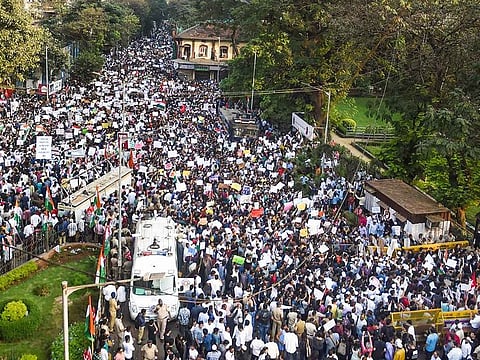Modi government to come under heavy international censure for CAA
US State Department Office of International Religious Freedom to table its report on India

The Modi government’s allergy to any criticism and a renewed push for the contentious Citizenship Amendment Act (CAA) which has a religious filter has ensured renewed international concern about its action.
Senior foreign office sources say that cumulatively concern from international bodies is currently the one record that the Modi government holds. J.P. Nadda, BJP president’s recent comments on the CAA being non-negotiable has worried the foreign office. Later this month the United States’ State Department Office of International Religious Freedom is expected to table its report on India. The report is expected by October 31 and senior officials fear that India may come in for public censure.
This would also explain the kinder gentler face that Amit Shah, Union Home Minister, has sought to present to the world post his long convalescence from COVID-19. Shah was the face of the citizenship bill enacted on December 12, 2019 after it was cleared by Parliament. It promised to fast-track citizenship for undocumented migrants belonging to six faiths not including Islam and Judaism, who fled from religious persecution in Bangladesh, Afghanistan and Pakistan before December 21, 2014.
On December 19, 2019, U.N. Secretary General Antonio Guterres had spoken of worries over the “risk of statelessness” that arose from the CAA being used as a discriminatory measure and that the UN was ‘concerned’ that the CAA was ‘fundamentally discriminatory in nature’. “We are concerned about the violence and alleged use of excessive force by security forces that we’ve seen that have been taking place in the protests against the Citizenship Amendment Act. We very much call for restraint and urge full respect for the rights of freedom of opinion and expression and peaceful assembly,” Guterres’ spokesman Stephane Dujarric had stated.
In March 2020, in an unprecedented and rare move, the Geneva-based Office of the High Commissioner for Human Rights (OHCHR) filed an application in the Indian Supreme Court, asking to be impleaded in the petitions challenging the Citizenship Amendment Act. Michele Bachlet filed I.A No. of 2020 WP (Civic) No. 1474 0F 2019 praying that she be allowed to make submissions before this Honourable Court in the instant case as per Order XVn, Rule 3 of the Supreme Court Rules, 2013.'
The WP had stated that: “The High Commissioner seeks to intervene as amicus curiae (third-party) in this case, by virtue of her mandate to inter alia protect and promote all human rights and to conduct necessary advocacy in that regard, established pursuant to the United Nations General Assembly resolution 48/141.” Its primary concern was stated to be “the CAA also raises other equally important human rights issues, including its compatibility in relation to the right to equality before the law and non-discrimination on nationality grounds under India’s human rights obligations.”
On October 20, 2020, The UN High Commissioner for Human Rights (UNHCHR) Michelle Bachelet appealed to Government of India to review the Foreign Contribution (Regulation) Act and its compliance with international human rights norms, and regretted that it was being “used to deter or punish NGOs for human rights reporting”.
“Constructive criticism is the lifeblood of democracy. Even if the authorities find it uncomfortable, it should never be criminalised or outlawed,” Bachelet said. Her statement referred to over 1,500 arrests made in relation to protests against the Citizenship Amendment Act and for violating the Unlawful Activities Prevention Act, as well as those made in the Elgaar Parishad case that includes the most recent arrest of Catholic-priest Stan Swamy, and the closure of Amnesty International after its bank accounts were frozen due to alleged FCRA violations. “I urge the government to ensure that no one else is detained for exercising their rights to freedom of expression and peaceful assembly — and to do its utmost, in law and policy, to protect India’s robust civil society,” the High Commissioner said.
Before the FCRA and CAA had raised the hackles of the UN and its human rights organisations, the previous High Commissioner, Zeid Hussain, had presented the first-ever report of human rights violations on Kashmir in June 2018, which was followed up by another in June 2019. Both were scathing in their criticism of Indian security forces and their operations in Kashmir, while also devoting some space, though much less, to similar violations in the Pakistan administered part of Kashmir.
Sign up for the Daily Briefing
Get the latest news and updates straight to your inbox








